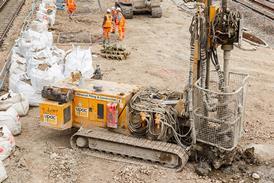Planning engineer Barry Lingham tells Marissa Charles how he helps British firms in Europe avoid contractual pitfalls.
<b>You run two companies. How do they differ?</b>
Charnwood Construction is a consultancy: I'm basically a freelance programming engineer with five or six clients a year. I provide anything to do with programme and planning, from the tender stage to contracts, from construction to claims.
With Contract Solutions, we hope to bridge the gap between European contractors that want to work over here and British companies working in Europe. As Britain becomes a bigger part of the European Union, the difference in customs and contracts is going to be a growing problem. So I teamed up with a consultant claims specialist to form Contract Solutions Europe in May 2000.
<b>How do you divide your time?</b>
About 35-40 hours a week go to Charnwood, 12 to my MSc and 10-12 to Contract Solutions, with a few hours in between for sleeping and eating.
Contract Solutions formally launches this year.
<b>What does it hope to achieve?</b>
We aim to persuade companies that spending a few thousand pounds up front to have a knowledgeable team vet your contract will prevent problems and save money later on.
<b>Why is the company based in Maastricht?</b>
To give Contract Solutions a pan-European feel, and avoid giving the impression that we are just a British company working in a typical British way. Companies aren't delineated by countries much now, especially by the Americans, who have a more global outlook and see Europe as one country.
<b>Do you have a legal background?</b>
My partner in Contract Solutions has more experience than I have: 15 to 20 years. That's why I'm doing an MSc in construction law – to bring me up to his level, and for a bit of mental stimulation.
<b>What should clients expect from Contract Solutions?</b>
We are engineers first and legal experts second.
A lot of legal experts don't get their message across because they cloak it in legal-speak.
We don't want to hide behind terminology. Because we both come from an on-site background, we understand on-site problems.
We also make use of modern technology – the construction industry is notoriously conservative and very slow to take on new ideas.
<b>How did you move into planning?</b>
My whole career is down to fate. I finished college in 1982; there was a recession on and I had to take the only job I was offered. After a year of basic training, I was asked if I wanted to be a quantity surveyor or a planning engineer. I didn't want to be a QS, so I became a planner. I formed my own business in 1992 after being made redundant in the last recession.
<b>How do you relax?</b>
If I'm lucky, with a bottle of wine and a video.
“As Britain becomes a bigger part of the EU, the difference in customs and contracts is a growing problem” |























